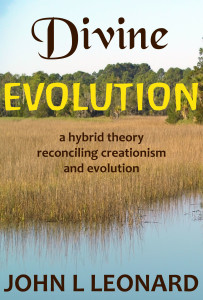[AUTHOR’S NOTE: This was another article originally published as the Atlanta Creationism Examiner, the first in a short series written shortly before the publication of my book Counterargument for God. The purpose of the series was to explain my alternative to Darwin’s theory of natural selection as the best potential explanation for the origin of new species, based on the existing evidence. Although my alternate hypothesis involves a supernatural intelligence capable of designing the universe and life within, it is called iterative creation. Other articles in this series include The conjecture of evolution, Compounded improbabilities, and Iterative creation.
This morning an atheist acquaintance on the internet inspired publication of this piece (originally written in 2012) by accusing me of advocating intelligent design as a scientific theory. The reality is that my argument is almost the polar opposite extreme — iterative creation is a philosophical hypothesis that competes with the philosophy known as “macro” evolution to explain the existing scientific evidence, which consists of DNA analysis, the known fossil record, and comparative anatomy.]
purchase stromectol online  The “facts” of evolution
The “facts” of evolution
This might take a while.
The argument from authority, which could also be called the argument of superior intellect, gets old after a while.
You don’t have to convince me that you’re smart.
I’ll give you the benefit of the doubt.
You only need to convince me that you’re right.
Then I’ll actually believe what you tell me.
A new Facebook friend tried to help me, sending a link to a HuffPo article explaining why my Christian faith Shemonaīkha required accepting evolution as fact.
Article author Mr. Dudley said nothing new or interesting except:
In this analysis, Christians must accept sound science, not because they don’t believe God created the world, but precisely because they do.
With all due respect sir, I only must accept sound science when it makes sense or is provably true. Seeing is believing.
Ironically, Mr. Dudley might be tempted to join Mr. Dawkins and assure me that some things I have seen were “all in my head.”
I even devoted a chapter of Divine Evolution to ask that question, “Is It In My Head?”
Asked, then answered with a little help from Carl Jung.
In his article, Dudley advocates accepting Francis Collins’ theory called theistic evolution. The subject was broached first when I wrote a review of his book The Language of God.
While I appreciate Dr. Collins’ contribution to decoding the human genome, I think his skills in deductive reasoning are as challenged as, well…Richard Dawkins.
This article is the first in a series inspired by Dawkins’ book The Greatest Show on Earth: the Evidence for Evolution.
It will be soon followed by a complementary piece tentatively titled The conjecture for evolution.
In his most recent tome, Dawkins made some rather audacious claims about evolution that demand to be addressed.
His first, and most bold claim, is to assert the “fact” of evolution. He writes,
Evolution is a fact. Beyond reasonable doubt, beyond serious doubt, beyond sane, informed, intelligent doubt, beyond doubt evolution is a fact. The evidence for evolution is at least as strong as the evidence for the Holocaust, even allowing for eyewitnesses to the Holocaust. It is the plain truth that we are cousins of chimpanzee, somewhat more disk that cousins of monkey, more distant cousins still of aardvarks and manatees, yet more distant cousins of bananas and turnips…continue the list as long as desired. (pg 8) [bold and italics added for emphasis]
Did you catch that? Dawkins is asserting that I am insane and stupid for daring to question whether or not I might be the distant cousin of a turnip, but I didn’t just fall off the turnip truck. What a curious definition of insanity!
I would never be so bold to respond in kind. Remember, he does argue from authority.
Richard Dawkins is a former Oxford professor and the Charles Simonyi beneficiary/recipient with a PhD in zoology. To be open and honest about the limits of my formal education, I graduated with a BBA in Management Information Systems from UGA. So we’re not exactly comparing an apple to an apple. Advantage to Mr. Dawkins.
Mr. Dawkins has also written ten books, including the international best seller The God Delusion, with sales in excess of 2 million copies. By comparison, to date I’ve written one book called Divine Evolution that somebody else was kind enough to publish, some short stories I’ve sold and an unpublished detective novel. I’m certain the number of copies sold of Divine Evolution is greater than zero, but by how many is anyone’s guess. It may not have reached triple digits — yet. [Author’s update: up to six published works as of this republication.]
Check. Advantage again to Mr. Dawkins, however.
The first chapter of The Greatest Show on Earth is littered with names dropped of clergy that support evolution theory: the Bishop of Oxford and the Pope, just to name two “enlightened bishops and theologians” as Dawkins quaintly described them.
Dawkins’s argument from authority is buttressed by scientific and religious authority, neither of which impresses me unduly. Sorry, but I’m not Catholic, Anglican, or a scientist.
His argument from authority won’t stop me from asking a few pointed questions. We have not yet reached checkmate.
What is a theory? What is a fact?
The Oxford English dictionary gives two meanings for the word “theory.”
Theory, Sense 1: a scheme or system of ideas or statements held as an explanation or account of a group of facts or phenomena; a hypothesis that has been confirmed or established by observation or experiment, and is propounded or accepted as accounting for the known facts; a statement of what are held to be the general laws, principles, or causes of something known or observed.
Richard Dawkins liked that first definition, but not this second one…
Theory, sense 2: a hypothesis as an explanation; hence, a mere hypothesis, speculation, conjecture; an idea or set of ideas about something; an individual view or notion.
Mr. Dawkins contends “Sense 1” conveys the appropriate use of the word “theory” as it applies to scientific theories such as the Newtonian theory of gravity or our “belief” that the Earth revolves around the sun.
We’re pretty sure about gravity and the operation of our solar system through direct observation of the effects of gravity and the annual revolution of the Earth around the sun.
Dawkins distinguishes between the two definitions by saying “common sense treats it [scientific theory] as a fact.”
Fact: Something that has actually occurred or is actually the case; something certainly known to be of this character; hence, a particular truth known by actual observation or authentic testimony, as opposed to what is merely inferred, or to a conjecture or fiction; a datum of experience, as distinguished from the conclusions that may be based upon it.
Eureka! He’s opened the door for me to use common sense to discuss the “facts” of evolution.
Now, we’re talking!
And the first thing I’d like to say is that the argument from authority does not allow one to make up words if the opposition isn’t allowed.
Remember how I got lambasted [Author’s note: you shouldn’t unless you read my work during my tenure as Atlanta Creationism Examiner] for inventing a term to describe a “scientific” theory that seemed to lack a name? I called it “forked speciation” (the actual technical term is allopatric speciation) to describe the “evolution theory” explanation for Archaeopteryx, and the objections were deafening.
Well, Richard Dawkins invented the word “theorum.”
I object. I was simply following his example, which was to make up a word to describe something for which I didn’t know the technical term. His definition of his made-up word was as follows:
Theorum: it has been confirmed or established by observation or experiment, and is propounded or accepted as accounting for the known facts; [it is] a statement of what are held to be the general laws, principles or causes of something known or observed.
Evolution is neither a theory or a fact. It’s a philosophy that extrapolates Darwin’s theory of natural selection as an interpretive explanation of scientific evidence. The evidence is indisputable. The interpretation is not.
It’s isn’t a silly made-up term like “theorum” or an equally ridiculous “meme.”
The facts of evolution are quite easy to summarize.
- Things change.
- All living organisms have unique DNA, meaning that an DNA can be classified to belong
to a particular species, then further to one specific animal within that species. - There are rocks with impressions of dead animals and plants called fossils. This “fossil
 record” indicates that vastly different animals like dinosaurs lived in the past. Most modern creatures are quite different than these ancestral forms, but there are modern versions of the earliest forms of living organisms on Earth.
record” indicates that vastly different animals like dinosaurs lived in the past. Most modern creatures are quite different than these ancestral forms, but there are modern versions of the earliest forms of living organisms on Earth.
Those are “just the facts”, as Detective Joe Friday used to say on Dragnet. The “facts” of evolution speak for themselves.
And I will cheerfully stipulate that the above facts are true.
Assuming we agree on this much, we can now examine the conjecture about evolution.

I have clashed with Francis Collins’ Biologos group at my church. They want to make church a safe space for professors as its located next to CU. Their tactic was to set up the strawman of YEC and knock it over, conjoining it to the intelligent design in the process. Theistic evolution is void of science and accepts full on materialist Darwinism. I suspect the ID folks at the Discovery Institute are much closer to the truth.